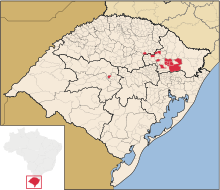Talian
Talian is a variant of the Venetian language that is spoken in Brazil mainly in the Serra Gaúcha in Rio Grande do Sul and in the west of Santa Catarina in the south of the country.
Italian immigration began in the late nineteenth century. At that time there was no uniform Italian , dialects were predominant. Most of the Italians who immigrated to Brazil came from northern Italy and spoke Venetian.
This was changed more and more over time through contact with other dialects of the Italian immigrants and through Portuguese . Although Talian remained relatively close to the Venetian dialect, both in spoken language and grammatical, it is not considered a Talian Creole of Italian, but rather a Brazilian variant of Italian. Just as Riograndens speak Hunsrückisch , a dialect of descendants of Germans in the south of Brazil, Talian is not a foreign language there, but a Brazilian national language, but without official status.
The use of the Italian language in Brazil has declined since the 1940s when the nationalist government of Getúlio Vargas banned its use, both oral and written. Speaking Italian was considered offensive and a lack of patriotism, and Italians and their descendants were forced to learn Portuguese. The Italian immigrants who lived in the Serra Gaúcha were one of the few groups able to preserve the Italian language in Brazil.
The number of Talian speakers in Brazil is unclear, estimated at 500,000, with their speakers also speaking Portuguese. The Brazilian government is currently working to save the Italian language, especially that of the Italians in southern Brazil. Italian was also included in the school curriculum. In small towns in the Serra Gaúcha and in western Santa Catarina state, local radio stations broadcast a few hours of their programs in Talian.
literature
- Bernardete Soldatelli Oliboni: A estigmatização como fator determinante dos bloqueios de fala de descendentes de imigrantes italianos do nordeste do Rio Grande Do Sul. In: Revista de la Escuela de Lenguas Modernas. Universidad del Salvador, Buenos Aires. Volume 1, 2004, No. 2, pp. 79–91 ( digitized version , with further literature; PDF, 151 kB).

